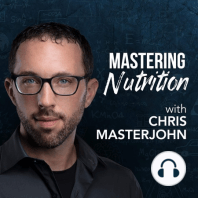82 min listen

The Biochemistry of Why Insulin Doesn't Make You Fat | Mastering Nutrition #35
The Biochemistry of Why Insulin Doesn't Make You Fat | Mastering Nutrition #35
ratings:
Length:
107 minutes
Released:
Jul 22, 2017
Format:
Podcast episode
Description
Do carbs and insulin make you fat? The argument centers on the ability of insulin to promote the conversion of carbohydrate to fat and lock fat in adipose tissue, as well as the necessity of glucose to provide the backbone to fat molecules within adipose tissue. But the argument ignores that all of these pathways are fundamentally regulated at a biochemical level by how much energy you need and how much you have. In episode 44 of Mastering Nutrition, we take a deep dive into the details of the biochemistry and see how insulin serves as a gauge of whole-body energy and glucose availability but simply can't be the thing that makes you fat. This episode is brought to you by Ample Meal. Ample is a meal-in-a-bottle that takes a total of two minutes to prepare, consume, and clean up. It provides a balance of fat, protein, and carbohydrate, plus all the vitamins and minerals you need in a single meal, all from a blend of natural ingredients. The protein is from whey and collagen. The fat is from coconut oil and macadamia nut oil. The carbohydrates, vitamins, and minerals come exclusively from food sources like sweet potatoes, bananas, cocoa powder, wheat and barley grass, and chlorella. I use Ample on Mondays when I have 12 hours of appointments with breaks no longer than 15 minutes. It keeps my brain going while I power through the long day, never letting food prep make me late for an appointment. Head to amplemeal.com and enter the promo code “CHRIS15” at checkout for a 15% discount off your first order. This episode is brought to you by US Wellness Meats. I use their liverwurst as a convenient way to make a sustainable habit of eating a diversity of organ meats. They also have a milder braunschweiger and an even milder head cheese that gives you similar benefits, as well as a wide array of other meat products, all from animals raised on pasture. Head to grasslandbeef.com and enter promo code “Chris” at checkout to get a 15% discount on any order that is at least 7 pounds and is at least $75 after applying the discount but under 40 pounds (it can be 39.99 lbs, but not 40). You can use this discount code not once, but twice! Show notes for this episode are found at chrismasterjohnphd.com/44. In this episode, you'll find all of the following and more: 00:45 Cliff Notes 10:15 The biochemistry and physiology of the carbohydrate/insulin hypothesis of obesity: insulin stimulates de novo lipogenesis (fatty acid synthesis), promoting the conversion of carbohydrate to fat; insulin stimulates lipoprotein lipase (LPL) and inhibits hormone-sensitive lipase (HSL) at adipose tissue, locking fat into fat cells; since adipose tissue lacks glycerol kinase, it cannot reuse the glycerol backbone of fats digested by lipoprotein lipase, and dietary carbohydrate is needed to provide the glycerol 3-phosphate that forms the backbone of newly resynthesized triglycerides. 16:30 All biochemical pathways are regulated by cellular energy status. Key players are ATP, ADP, AMP, AMP kinase (AMPK), NADH/NAD+, FADH2/FAD, Ca2+, CoA and acyl CoAs, and citrate. 30:42 Although insulin promote storage of fat in fat tissue, this can be overridden by low energy status. 40:10 Although insulin promotes fat storage, it causes a proportionate increase glucose oxidation, so no net change in caloric balance. 46:10 Glucose oxidation in muscle is driven by energy status and that determines the availability of glucose to adipose tissue. 01:00:45 Glucose can act as the source of glycerol 3-P for adipose tissue triglyceride synthesis, but it isn’t necessary because of gluconeogenesis and glyceroneogenesis. Furthermore, while it can serve this role, the degree to which it does so is driven by energy status. 01:05:50 Glucose can act as a source of glycerol 3-P for adipose, but it needs a source of fatty acids, which come mainly from fat as long as energy status is high enough. 01:06:50 Insulin can drive de novo lipogenesis, but only when energy status is high enough. 01:20:05 What hap
Released:
Jul 22, 2017
Format:
Podcast episode
Titles in the series (100)
026: When Fat People Can't Get Fat Enough and Lean People Get Fat in All the Wrong Places: In episode 25, Insulin Resistance Isn't All About Carbs and Insulin, I explained why an individual cell would "decide" to stop taking up energy. Here in episode 26, I explain tissue-level energy overload, focusing on adipose tissue and liver. At... by Mastering Nutrition